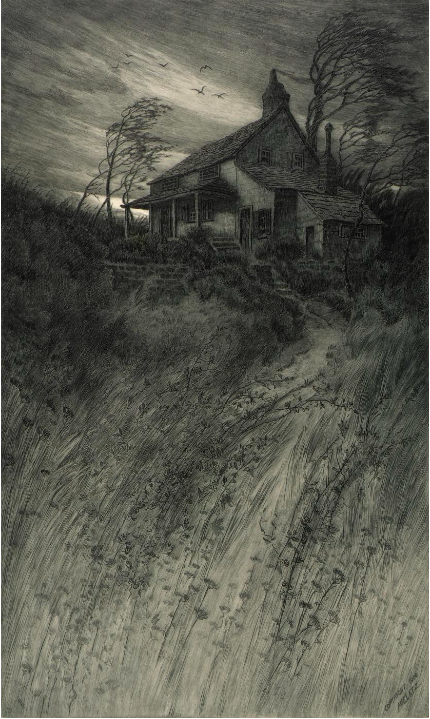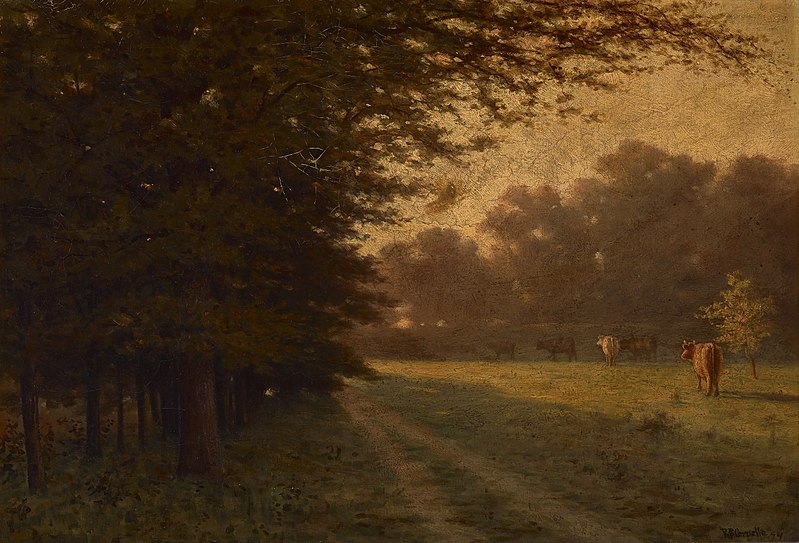The Wind and Rain
By Mary Hannah Krout
Annotations by Rene Marzuk

Who is tapping at my window
In the silence of the night?
The stars by clouds are hidden,
Who can come so late, unbidden,
Like a lost child sobbing in affright?
“It is I, your friend, the rain,[1]
Tapping at the window pane—
Let me in!
From beyond the farthest sea,
I have wandered far to thee;[2]
Waited, waited long, until
Sky and breeze should work their will—[3]
Lift me from the rose’s heart,
Make me of the clouds a part—
And from frost, from snow, from dew
I was changed, and formed anew,
Till at last, from birth to birth,
I have wandered back to earth.
Of my journeys to and fro
I can tell thee. Wouldst thou know
Secrets that the green leaves keep—
Secrets buried dark and deep
Underneath the restless waves—
In the depths of gem-starred caves?
How the sunset hues are made?
Why the rainbow glories fade?
Listen, ere I flee away
With the coming of the day—
Let me in.”
Who comes knocking at my door
In the waning of the night?
Pallid grows the east with dawn,
And the darkness almost gone
Falters in the growing light.
“It is I, your friend, the wind—
Let me in!
I have hastened far and fast,
Over land and water passed,
Over churchyards moaning crept,
Over hut and a palace swept.
Perfumes of the fir and pine,
These, to thee, as gifts, I bring—
Take the balmy offering!
Voices of all life I bear;
Sounds I bring from everywhere;
Song, and laugh, and wedding bell,
Sigh, and dirge, and funeral knell;
hum of traffic, words of cheer,
Shouts of triumph, shrieks of fear,
Prayers, from lips in anguish wrung,
Lullabys o’er cradles sung,
Chanting choir, and organ strain,
Martial music, groans of pain;
Rustling leaves that I have stirred,
Voice of insect, beast and bird,
Babbling brook and waterfall;
Shepherd’s pipe, and herdman’s call;
Pleasant news I have to tell
Of the one thou lovest well;
I caressed her forehead fair,
Played amid her shining hair;
Stole across her gentle eyes,
Dreaming under foreign skies;
Listening, caught, as I fled,
Pleasant words her sweet lips said;
Wilt thou listen? Wilt thou hear,
While I loiter, waiting near?—
Let me in!”
I pause to listen, but the sprites have flown—
The wind and rain.
Above the hills a deep’ning splendor breaks—
‘T is day again.
And thus forever hurrying on, like spirits vexed,
Their stories never told,
The wind shall still complain, the whispering rain
Sigh at the window pane,
And keep their secrets while the world grows old.

KROUT, MARY HANNAH. “THE WIND AND RAIN.” THE LITTLE CORPORAL VOL. XVI, NO. 2 (FEBRUARY 1873): 42.
[1] Krout’s anthropomorphizes both the rain and the wind, which adds to the poem’s overall feeling of romantic engagement with nature.
[2] The author was a bit of a wanderer herself. An Indiana-born journalist, author, and women’s suffrage advocate, she travelled globally and reported extensively.
[3] Note how the rain is stereotypically characterized as a female figure throughout this stanza. Moreover, “her” dependence on the sky and breeze, with no equivalent in the characterization of the wind, suggests limited agency.
Contexts
“The Wind and Rain” was published in The Little Corporal magazine eight years after the American Civil War (1861-1865). Both the rain and the wind try to convince the speaker to let them in with lists of what they have learned or witnessed during their journeys. Their pleads suggest a unified world (perhaps even a unified America) where, interestingly, both natural and social elements combine.
Definitions from Oxford English Dictionary:
- affright: The state of being frightened; terror, fright.
- dirge: A song sung at the burial of, or in commemoration of, the dead; a song of mourning or lament.
- knell: The sound made by a bell when struck or run, especially the sound of a bell rung slowly and solemnly, as immediately after a death or at a funeral.